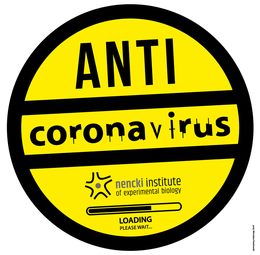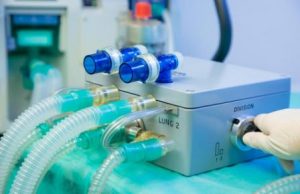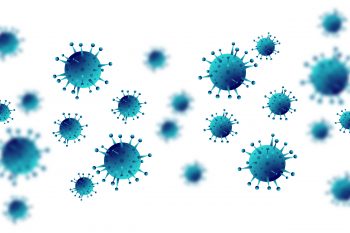There is no need to convince anyone about the importance of the voice and work of scientists in the fight against the coronavirus pandemic. An evidence-based discussion and an intensified activity in the field of research and innovation are essential at such a specific time. Therefore, we would like to introduce some of the activities undertaken, mainly by the Polish Academy of Sciences (PAS), for the fight against the SARS-CoV-2 virus. Below you could find information about the interdisciplinary COVID-19 Advisory Team, established by President of PAS, as well as a short description of selected – international or national – research projects carried out by the PAS Institutes and the International Institute of Molecular and Cell Biology in Warsaw.
COVID-19 Advisory Team
On 30th June 2020, the interdisciplinary Advisory Team on COVID-19 was established by the President of the Polish Academy of Sciences. Its purpose is primarily to monitor the course of the epidemic in Poland, analyze possible scenarios and formulate recommendations. The team is also to establish cooperation with similar groups in other countries to exchange experiences and good practices with them.
Professor Jerzy Duszyński, President of the PAS, will chair the Team. Prof. Krzysztof Pyrć, a specialist in microbiology and virology from the Jagiellonian University in Cracow, will be his deputy, while Dr. Aneta Afelt, a health geographer from the Interdisciplinary Center for Mathematical and Computational Modeling at the Warsaw University will be the Team’s secretary.
The team also includes: prof. Radosław Owczuk (Medical University of Gdańsk), Anna Ochab-Marcinek, PhD, DSc (PAS Institute of Physical Chemistry), Magdalena Rosińska, MD, PhD,DSc (National Institute of Public Health – National Institute of Hygiene), prof. Andrzej Rychard (PAS Institute of Philosophy and Sociology), dr hab. Tomasz Smiatacz, MD, PhD,DSc (Medical University of Gdańsk). Other invited experts may also participate in the work of the group.
Research projects on SARS-CoV-2

Scientists from the Institute of Bioorganic Chemistry of the Polish Academy of Sciences (IBCH PAS) in Poznań were one of the first in Poland who began to work on tests to detect the presence of SARS-CoV-2 in the human body. They immediately launched the SARS-CoV-2 Viral Support Group, working 24 hours a day. The group is led by Luiza Handschuch, PhD, and the spiritus movens of the entire activity of IBCH PAS in the fight against COVID-19 is prof. Marek Figlerowicz, Director of IBCH PAS.
What’s more, scientists from the IBCH PAS developed – in cooperation with Polish companies – the production of their own test. Its quality is as good as commercial tests, and it is much cheaper and just as affordable. The test from the IBCH PAS is a genetic type, very precise, sensitive, detecting the genetic material of the virus with 100% certainty. Initially, this project was financed only from the Institute’s own resources, but the launch of large-scale test production required financial support. The first subsidy (100,000 PLN) was provided by the Marshal Office of the Wielkopolska Region, and in April the Ministry of Science and Higher Education offered 15 million PLN, thanks to which the production of 150,000 tests began. Countries such as Norway, Germany and South Africa expressed their interested in Polish tests.
It is also worth adding that 3 scientists from the IBCH PAS also received grants from the National Science Centre under Express call to fund research into COVID-19. Professor Elżbieta Kierzek will carry out SARS-CoV-2 RNA, target of inhibition for virus replication project, Paweł Zmora, PhD, will deal with TMPRSS2 – a potential new drug target and a determinant of COVID-19 outcome, and prof. Mariusz Jaskólski is going to validate PDB models of potential drug design targets for SARS-CoV-2 coronavirus.
The importance and potential of IBCH PAS in SARS-CoV-2 research is clearly demonstrated by the fact that the Institute, together with the Poznan Super-computing and Networking Center affiliated with IBCH PAS, was selected as the national node of the European Covid-19 Data Platform, coordinated by the European Bioinformatics Institute operating in the framework of the European Molecular Biology Laboratory (EMBL). It is one of the activities under the ERA Vs Corona Action Plan.

Furthermore, the International Institute of Molecular and Cell Biology in Warsaw (IIMCB) is a participant of the international consortium EXSCALATE4CoV (E4C), financed under the Horizon 2020 (1st COVID-19 call).
So far, the consortium has tested over 400,000 molecules – all thanks to the super-computing platform. It enables research to be carried out within a few weeks, the implementation of which would take many years using traditional techniques. On this basis, the consortium announced that raloxifene, a medicament used to treat osteoporosis, could be effective against COVID-19 in patients with mild symptoms of infection. Moreover, the raloxifene is safe and well-tolerated by patients. These results have recently been mentioned by Ursula Von Der Leyen, the President of the European Commission, and Mariya Gabriel, the Commissioner for Innovation, Research, Culture, Education and Youth. Newsweek also wrote about the E4C consortium.
The consortium consists of 18 institutions from seven European countries. The work of the IIMCB team is led by Marcin Nowotny, PhD, head of the protein structure laboratory, winner of the ERC grant and the prestigious Howard Hudges Medical Institute (HHMI) Early Career Scientist Award. The main task of the IIMCB is to accelerate the experimental part of the project.
What is more, the IIMCB conducts a number of projects that have received national funding for new research tasks related to the Covid-19 pandemic, e.g. as part of an additional competition from the Foundation for Polish Science. Such funds were awarded to the aforementioned Marcin Nowotny or prof. Andrzej Dziembowski (both with the TEAM program). Additional funding for research activities related to COVID-19 has also been given to scientists from PAS Institute of Physical Chemistry, PAS Institute of Organic Chemistry, PAS Institute of Bioorganic Chemistry, and PAS Nencki Institute of Experimental Biology.

Another Institute of the Polish Academy of Sciences that is involved in research on the coronavirus is the Space Research Centre (CBK PAS) – a participant in the international project Health Emergency Response in Interconnected Systems (HERoS), which is to help fight the SARS-CoV-2 pandemic. 11 partners from 6 European countries, and the project itself received funding under the 1st COVID19 H2020 call (SC1-PHE-CORONAVIRUS-2020). Its budget is over 2.8 million euros.
The primary objective of the HERoS project is to improve systemic response to the spread of the coronavirus pandemic, including methods of preventing the spread of disinformation that causes irrational behavior in society. Scientists from the Crisis Information Centre of the CBK PAS will help to optimize systemic activities related to limiting the spread of SARS-CoV-2 virus. Specifically, CBK PAS will be responsible for the analysis and visualization of data showing the actual state of affairs and modeling results.

The Nencki Institute of Expiremental Biology in Warsaw (IBD PAS) is currently involved in several initiatives related to the fight against COVID-19. Within the framework of national funds, the SONAR project is financed, which aims to develop a new strategy of group testing in the diagnosis of SARS-CoV-2, which will allow for an increase in the efficiency of COVID-19 diagnosis, using the diagnostic facilities currently available in Poland. For its implementation are responsible: prof. Agnieszka Dobrzyń – Director of the Nencki Institute and Aleksandra Pękowska, PhD – Head of the Chromatin Biology and Epigenomics Laboratory, DIOSCURI Centre of Scientific Excellence, recently established on the basis of cooperation between the national National Science Centre (NCN) and the German Max Planck Society (MPG).
It is worth adding that the scientists from the Nencki Institute, together with their scientific partners from Poland and abroad, plan to expand their activities in the field of combating the coronavirus based on the funds from the Horizon 2020 framework program.

In The Nalecz Institute of Biocybernetics and Biomedical Engineering (IBBE PAS) in the team led by prof. Marek Darowski, the VENTIL device was developed, which works with a respirator and can be used in two applications. Firstly, in line with the original assumptions of the IBBE PAS team, device is designed for independent ventilation of both lungs of a patient in acute respiratory failure. Second, in conditions of ventilator shortage, Ventil devices can be used as independent ventilation for two patients connected to one ventilator. This application is particularly important in the current pandemic situation.
IBBE PAS started cooperation with the Institute of Medical Technology and Equipment (Łukasiewicz Network) in order to implement quickly the production of a series of Ventil devices. 100 Ventil devices were ordered and financed in March by the Ministry of Science and Higher Education. Clinical trials of the Ventil devices are commenced by 4 medical centers in the country: the Independent Public Clinical Hospital in Lublin, the University Clinical Centre in Gdańsk, the Regional Specialist Hospital and the University Clinical Hospital in Olsztyn. It is worth adding that the Ventil device has already obtained the CE certificate, so VENTIL can be sold across EU countries. The request for registration was also sent to the Office for Registration of Medical Devices.
The activities and initiatives presented above are only a small part of what scientists and PAS institutes are doing in the fight against the pandemic. The above picture is mainly activities of the nature of scientific and innovative projects, i.e. from the development of new molecular tests for the detection of SARS-CoV-2 virus or highly efficient group testing methods, through contributions to the search for new drugs against COVID-19 disease, to engineering solutions supporting the treatment of patients. As the PolSCA Office, we support all these activities, while encouraging and supporting our scientific community of the Polish Academy of Sciences in obtaining funds for this type of project under the Horizon 2020 framework program and its successors – Horizon Europe.
It is worth mentioning that the Polish Academy of Sciences and the network of research institutes of the PAS are involved in the fight against the new coronavirus on many different levels. You can read more about this on the special website of the Polish Academy of Sciences, where apart from the success stories mentioned above, you can also see other examples of the PAN contribution to the fight against the pandemic. In this context, a special attention should be paid to the role of scientific information addressed to the public, e.g. on the use of masks or behavior during the ongoing presidential elections.
If you want to receive similar information and to be regularly updated via PolSCA Office, subscribe to our newsletter!
Published: 2020-07-07
Author: J. Kramarczyk



